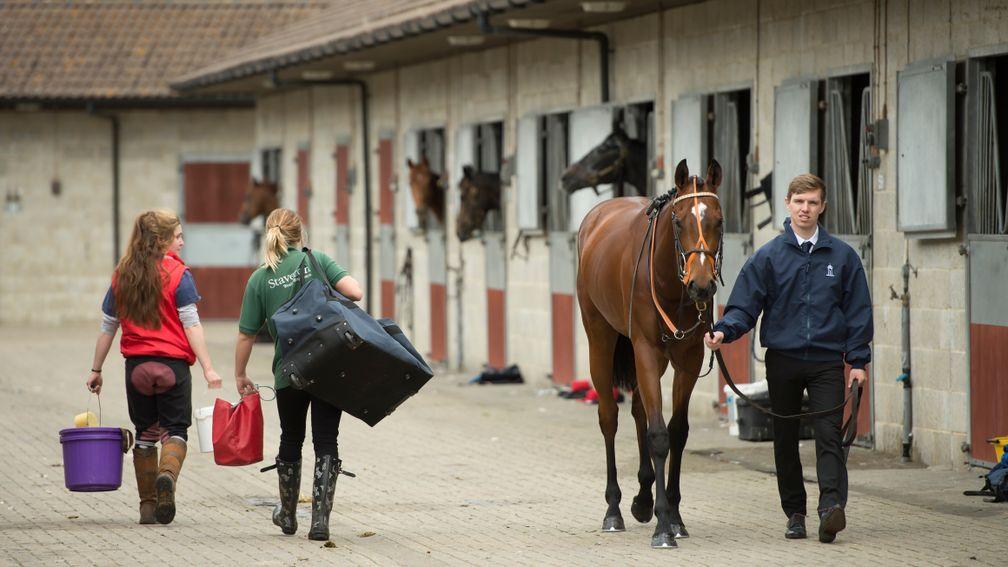Staff pay rise agreed as talks on 'seismic' change continue

Stable staff and trainers have come to an interim agreement on a pay rise for the sport's workforce as they attempt to make what has been described as a "seismic" change to working practices in the industry.
From October 2 a three per cent increase in wages will be applied to the industry's minimum permitted pay rates across all six pay scales.
However, the National Joint Council for Stable Staff agreement will run until April 1, rather than a full year, as discussions continue over the definition of the working week and overtime rates.
Work has been going on across British racing to address the issue of staff recruitment and retention, with the shortfall in staff estimated to stand at around 400, although that is an improvement on recent figures.
National Association of Stable Staff (Nass) chief executive George McGrath said: "We're trying to make a seismic change within the industry which, to be fair, is common practice in any other industry."
In Britain staff have traditionally worked 45 hours in their week 'on' and 40 hours in their week 'off', but McGrath said attempts were being made to bring in a 40-hour working week.
"We're looking to try to alleviate the pressure on them by bringing in a 40-hour week, where there would be a requirement to work some part of the weekend but they would be able to formalise it between the employer and staff.
"So it would become possible to have an entire weekend off, or two consecutive days off, or whatever way a 40-hour week looked to you.
"Anything over a 40-hour week would be paid at a rate of overtime - those figures have yet to be agreed."
McGrath said staff were effectively being paid overtime at close to the national minimum wage.
"We need to move away from that and the feeling within the NTF [National Trainers Federation] and among, I would like to think, a majority of trainers is that that is morally the right thing to do," he said. "But it's an enormous change for trainers to take into account and for them to budget in terms of a business.
"This is probably going to take a year, hence the interim agreement at three per cent. While not what I requested, it's still acceptable, particularly in light of the fact the public sector are getting their wage increases at one per cent.
"Although it's interim, we'd be looking to make significant changes to not only the way staff are paid but to the way they work their week."
McGrath, who has begun a second five-year term as Nass chief executive after nobody stood against him at the end of his first period in charge earlier this year, said there was "a good deal of will on behalf of the NTF to get this across the line".
He continued: "There is quite a big picture involved here and to implement and get the wording right, make sure everybody is absolutely clear on what they can and cannot do, is going to take some time."
NTF chief executive Rupert Arnold said talks had been "very constructive".
He said: "This is an interim agreement pending discussions between the two parties about the definition of the working week and also the hourly rate for when staff are working away from the yard.
"There are some quite fundamental changes we'd like to make, but it's not easy to do those in one step. That's partly why we need more time to agree some of the detail and make sure we fully understand the consequences of the decisions we're making."
If you are interested in this, you should read
Stud and stable staff awards
Published on 11 September 2017inNews
Last updated 10:08, 11 September 2017
- The latest edition of the Racing Post is available to read online now - here's how you can access it
- How Smart View recorded a 76 per cent profit at the Cheltenham Festival
- Smart View is available on the Racing Post app - how to read the revolutionary new racecard
- Levy reform talks 'accelerating' as clock ticks down to April deadline for agreement
- Kieran Shoemark lands another plum Meydan ride for Gosden stable on Trawlerman in Saturday's Dubai Gold Cup
- The latest edition of the Racing Post is available to read online now - here's how you can access it
- How Smart View recorded a 76 per cent profit at the Cheltenham Festival
- Smart View is available on the Racing Post app - how to read the revolutionary new racecard
- Levy reform talks 'accelerating' as clock ticks down to April deadline for agreement
- Kieran Shoemark lands another plum Meydan ride for Gosden stable on Trawlerman in Saturday's Dubai Gold Cup